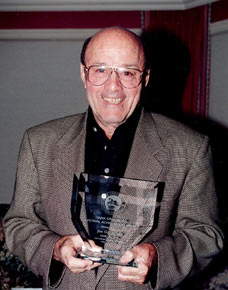Hank Greenberg Lifetime Achievement Award
Henry Benjamin Greenberg was born into an Orthodox Jewish household in 1911.

By the time he reached high school in the Bronx, Greenberg stood 6’3″ and was an All-City athlete in soccer and basketball, but his favorite sport was baseball. Somewhat awkward in the field, Greenberg chose first base as his position. In 1929, Greenberg was offered a contract by the New York Yankees but turned it down because the immortal “Iron Man,” Lou Gehrig, was the incumbent Yankee first baseman. Instead, after a year at New York University, Greenberg signed a contract with the Detroit Tigers. Greenberg spent three years in the minor leagues, working hard each day to improve his fielding and hitting. After being named Most Valuable Player in the Texas League, he was promoted to the Tigers in 1933, batting .301 and driving in 87 runs.
In 1934, led by Greenberg’s .339 batting average, the Tigers jumped from fifth place in the American League to battle for the pennant. Never before had a player filled such a significant role for a major league team, and for the first time, Greenberg and Jewish baseball fans all over the country faced a dilemma. September 10 was Rosh Hashanah and the Tigers, who led the league by four games in the standings, were playing the Boston Red Sox. Fans and rabbis debated whether Greenberg, whose accomplishments on the field won acceptance for Jews among non-Jewish Americans, should play on the High Holy Days. Greenberg came up with his own compromise. He played on Rosh Hashanah and hit two home runs that won the game, 2-1; ten days later, he spent Yorn Kippur in a synagogue, and the Tigers lost. The Tigers won the pennant but lost the World Series to the Cardinals in seven games. A year later, the Tigers won the World Series and Greenberg was the first Jew voted Most Valuable Player in either league.
The 1938 season brought more drama for Greenberg when he challenged Babe Ruth’s record of 60 home runs in a season. With five games left Greenberg had hit 58. With the eyes of the world on Greenberg in those last five games, several pitchers chose to walk him rather than give him a chance to break Ruth’s record. While Greenberg never complained, many observers believe that Major League Baseball did not want a Jew breaking Ruth’s record.
In May 1940, Greenberg’s baseball career was interrupted when he was drafted into the Army. One of baseball’s highest paid stars, his salary dropped from $11,000 to $21 per month. In August, Congress decided that men over 28 years old need not serve, and Greenberg was honorably discharged. He planned to return to the Tigers the next season, but on December 7, 1941, the Japanese bombed Pearl Harbor and the U.S. declared war. Greenberg was the first major leaguer to enlist in the Army, even though he had been excused from serving. While he could have had a stateside job as an athletic instructor, Greenberg chose to serve in the Army Air Corps in the ChinaBurma-India Theatre, where he had a distinguished record. When the war ended in 1945, Greenberg, age 34, returned to the Tiger lineup in midsummer and hit a home run in his first game back. Greenberg led the Tigers to another World Series victory that year, personally clinching the American League pennant with a grand slam home run on the final day of the season. Greenberg played two more seasons and then retired.
After retirement, Greenberg compiled another series of firsts. He became the first Jewish owner/general manager in baseball, assembling the 1954Cleveland Indians team that won a record lll games. Greenberg and Bill Veeck then purchased the Chicago White Sox in 1959. That year, the White Sox won the pennant for the first time in 40 years. In 1961, Greenberg sold his baseball interests and went on to a successful career on Wall Street.
In 1954, Hank Greenberg became the first Jewish player to be elected to baseball’s Hall of Fame in Cooperstown. His pioneering efforts as a player and owner paved the way for Jews in the top ranks of Major League Baseball, whether as a Hall of Farner like Sandy Koufax, a general manager like Al Rosen, or an owner and commissioner of Major League Baseball like Bud Selig of the Milwaukee Brewers.
Past Honorees

- 1994 – Dr. Bobby Brown
- 1995 – George Kell
- 1996 – Al Rosen
- 1997 – Ralph Kiner
- 1998 – Joe Garagiola
- 1999 – Ted Williams
- 2000 – Tommy Lasorda
- 2001 – Dick Schaap
- 2001 – Sandy Koufax
- 2002 – Ernie Banks
- 2003 – Dave Winfield
- 2004 – Brooks Robinson
- 2005 – Johnny Bench
- 2006 – Ozzie Smith
- 2007 – Phil Niekro
- 2008 – Commissioner Bud Selig
- 2009 – Cal Ripken, Jr.
- 2010 – Al Kaline
- 2011 – Frank Robinson
- 2012 – Lou Brock
- 2013 – Joe Torre
- 2014 – Tony La Russa
- 2015 – Joe Morgan
- 2016 – Shawn Green
- 2017 – Fergie Jenkins
- 2018 – Ivan “Pudge” Rodriguez
- 2019 – Jack Morris
- 2021 – Rich “Goose” Gossage
- 2022 – Ted Simmons
- 2023 – Roger Clemons
